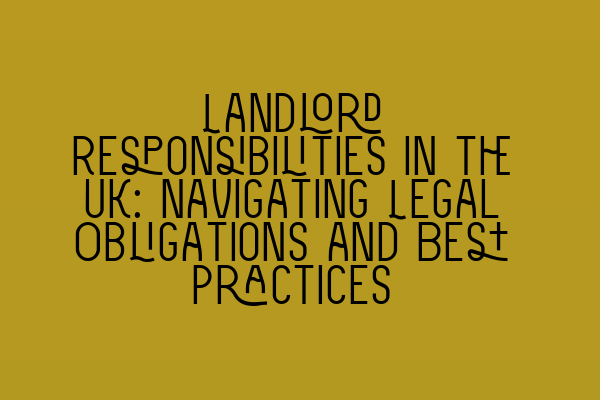[Title: Landlord Responsibilities in the UK: Navigating Legal Obligations and Best Practices]
[Opening Paragraph]
As a landlord in the UK, it is essential to understand your responsibilities and obligations to ensure a smooth and successful tenancy. From legal requirements to best practices, this blog post will guide you through the key aspects of being a responsible landlord. Whether you are new to the property market or an experienced landlord, staying informed and compliant is crucial. Let’s dive into the important details.
[Section 1: Safety and Compliance]
Ensuring the safety of your tenants should be your top priority as a landlord. Meeting the necessary safety standards is not only a legal requirement but also a moral obligation. Essential safety measures include:
1. Gas Safety:
Under the Gas Safety (Installation and Use) Regulations 1998, landlords are legally obligated to conduct an annual gas safety inspection by a Gas Safe registered engineer. This ensures that all gas appliances and fittings in the rental property are safe to use. Make sure to keep a record of the inspection and provide tenants with a copy.
2. Electrical Safety:
To comply with the Electrical Safety Standards in the Private Rented Sector (England) Regulations 2020, landlords must have electrical installations in their properties checked by a qualified electrician. EICR (Electrical Installation Condition Report) should be carried out at least every five years or whenever a new tenancy begins.
3. Fire Safety:
Proper fire safety measures are a must to protect both your tenants and your property. Install smoke alarms on each floor, carbon monoxide detectors in rooms with fuel-burning appliances, and provide fire extinguishers in communal areas. Make sure to check and maintain these devices regularly.
[Section 2: Repairs and Maintenance]
Maintaining your rental property is crucial for a positive tenant experience and to preserve the value of your investment. Key considerations include:
1. Repairs:
Fix any reported maintenance issues promptly. Common repairs include problems with heating, plumbing, or electrical systems. Responding promptly and efficiently to repair requests will enhance your reputation and tenant satisfaction.
2. General Maintenance:
Regularly inspect and maintain your property to prevent minor issues from becoming major problems. This includes checking the roof, gutters, drains, and addressing any damp or pest-related issues. Routine maintenance demonstrates your commitment to providing a safe and comfortable living environment for your tenants.
3. Energy Efficiency:
Increasing energy efficiency not only benefits the environment but can also attract tenants and reduce energy costs. Install energy-efficient appliances, improve insulation, and consider renewable energy options. This will not only make your tenants happy but also bring long-term financial benefits.
[Section 3: Tenancy Agreements and Rent Collection]
Creating a solid foundation for your tenancy relationship is crucial. Here are some important steps to take:
1. Tenancy Agreement:
Draft a comprehensive tenancy agreement that outlines the rights and responsibilities of both the landlord and the tenant. It should cover rent, deposit details, notice periods, property rules, and any other relevant terms. Seek legal advice if needed and tailor the agreement to comply with current legal requirements.
2. Rent Collection:
Establish a reliable and transparent rent collection system. Clearly communicate the rent payment due dates and acceptable payment methods. Consider using online platforms for hassle-free rent collection, which benefits both landlords and tenants.
3. Communication and Documentation:
Maintain regular communication with your tenants and keep records of all interactions. This helps to address any concerns or issues promptly and effectively. Documenting communications can be invaluable if disputes arise later on.
[Conclusion]
Being a responsible landlord in the UK goes beyond providing a safe and habitable property. It involves understanding and meeting legal obligations, maintaining the property, and establishing a positive relationship with tenants. By embracing these responsibilities and best practices, you can create a mutually beneficial arrangement and maximize your returns. Stay informed, adapt to evolving regulations, and always prioritize the well-being of your tenants.
[Blogger’s Note]
To succeed in the property law sector, it’s essential to be well-prepared for the SQE exams. To help you with your preparation, check out these related articles:
– [SQE 1 Practice Exam Questions](https://fqps.co.uk/sqe/sqe1-preparation/mcq-practice-quiz)
– [SQE 1 Practice Mocks FLK1 FLK2](https://fqps.co.uk/sqe/sqe1-preparation/practice-mocks-quiz)
– [SQE 2 Preparation Courses](https://fqps.co.uk/sqe/sqe2-preparation)
– [SQE 1 Preparation Courses](https://fqps.co.uk/sqe/sqe1-preparation)
– [SRA SQE Exam Dates](https://fqps.co.uk/sqe/sqe1-sqe2-exam-dates)
Remember, by investing in your legal knowledge and professional development, you can excel in your property law career. Good luck with your journey!
